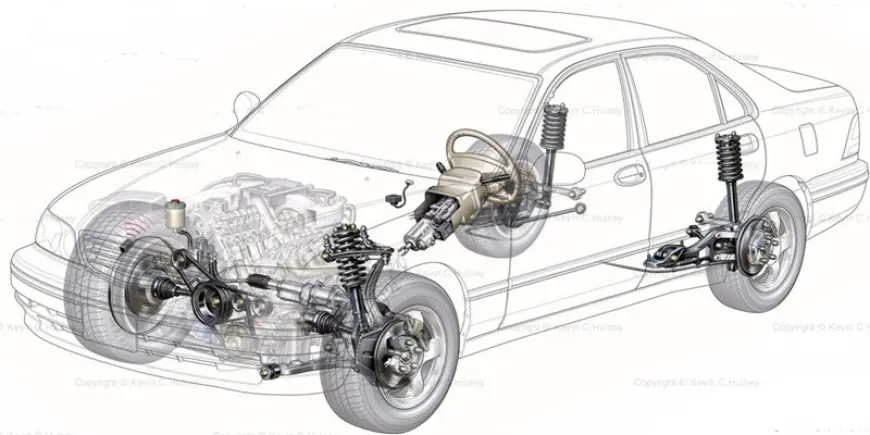Automotive Steering Systems Market 2030 Key Players
The global automotive steering systems market is driven by the overall growth of the automotive industry.

The global automotive steering systems market is undergoing a transformative phase, shaped by rapid technological advancements, growing emphasis on vehicle safety, and the surging demand for electrified and autonomous vehicles. According to TechSci Research, the global market was valued at USD 24.33 billion in 2024 and is projected to reach USD 37.68 billion by 2030, expanding at a robust CAGR of 7.59% over the forecast period. As automakers integrate smart technologies and lightweight materials into vehicle platforms, the steering systems industry is expected to witness dynamic innovation, making it a critical pillar of modern automotive engineering.
Emerging Trends in the Automotive Steering Systems Market
The automotive industry is undergoing a paradigm shift with the integration of smart and autonomous technologies. This shift is especially evident in steering systems, where conventional components are being replaced with highly intelligent alternatives that offer enhanced control, safety, and fuel efficiency.
1. Steer-by-Wire Technology
One of the most disruptive trends shaping the steering systems landscape is the adoption of steer-by-wire (SbW) systems. Unlike traditional steering mechanisms, SbW eliminates the need for mechanical or hydraulic linkages, replacing them with electronic actuators and sensors. This not only reduces vehicle weight but also enables real-time steering adjustments for improved handling, responsiveness, and driver comfort. SbW technology supports autonomous driving features and enhances vehicle customization through programmable steering modes.
2. Integration of Artificial Intelligence (AI) and Sensors
Advanced Driver Assistance Systems (ADAS) have brought AI and sophisticated sensors to the forefront. Steering systems are being enhanced with these technologies to support autonomous driving levels 3 and above. Lane-keeping assistance, lane-centering, and automated parking systems are increasingly reliant on steering systems that can adapt and respond to environmental data in real-time.
3. Lightweight Materials for Enhanced Efficiency
As automotive manufacturers push for fuel economy and emissions reduction, the use of lightweight materials in steering system components has become prevalent. High-strength aluminum alloys and composite materials are replacing traditional steel-based components, delivering improved efficiency without compromising performance or durability.
4. Customization and Adaptive Steering
The modern consumer increasingly demands personalization and intuitive vehicle experiences. Adaptive steering systems that modify steering response based on vehicle speed, terrain, and driving mode are becoming standard. These innovations enhance driver control and comfort while aligning with premium vehicle design trends.
Download Free Sample Report: https://www.techsciresearch.com/sample-report.aspx?cid=22730
Key Market Drivers
Several critical factors are propelling the growth of the automotive steering systems market globally:
1. Rise in Electric and Hybrid Vehicle Production
The exponential growth in electric and hybrid vehicle manufacturing is a key catalyst for the market. Electric Power Steering (EPS) systems, in particular, are ideal for electric vehicles as they reduce energy consumption compared to hydraulic counterparts. Automakers are investing heavily in EPS systems to align with green transportation goals.
2. Increasing Regulatory Standards
Government regulations around the world are increasingly focusing on vehicle safety and emissions. These mandates encourage the adoption of advanced steering systems that support driver assistance technologies. Stringent crash safety standards are also driving the demand for systems that provide greater maneuverability and control.
3. Consumer Demand for Safety and Comfort
There is growing consumer awareness and demand for vehicles equipped with smart, responsive safety systems. As more consumers prioritize safety and driving experience over cost, manufacturers are compelled to integrate innovative steering solutions even in mid-range vehicles.
4. Technological Partnerships and Collaborations
Partnerships between traditional automakers and tech giants have accelerated the development of next-generation steering systems. Collaborative efforts have led to quicker prototyping, better AI integration, and the creation of hybrid systems that meet evolving mobility needs.
Industry Key Highlights
-
Market Size in 2024: USD 24.33 Billion
-
Forecasted Market Size by 2030: USD 37.68 Billion
-
Compound Annual Growth Rate (CAGR): 7.59%
-
Leading Segment: Electrically Powered Steering Systems (EPS)
-
Fastest Growing Region: North America
-
Technological Focus: Steer-by-Wire, AI Integration, Lightweight Materials
Segmentation Overview
By Steering System Type:
-
Manual Steering Systems
-
Electrically Powered Steering Systems
-
Electro-Hydraulic Powered Systems
-
Hydraulic Powered Systems
By Component:
-
Hydraulic Pump
-
Steering Sensor & Column
-
Electric Motor
-
Others
By Sales Channel:
-
OEM
-
Aftermarket
By Region:
-
North America
-
Europe
-
Asia-Pacific
-
South America
-
Middle East & Africa
Regional Analysis: Spotlight on North America
North America remains the fastest-growing region in the global automotive steering systems market. The growth trajectory is underpinned by the increasing adoption of electric and autonomous vehicles, government support for smart transportation infrastructure, and the region's highly mature automotive manufacturing ecosystem.
-
Advanced Technology Adoption: North American automakers are early adopters of AI-enabled steering solutions, especially for Level 3 and Level 4 autonomous vehicles.
-
Regulatory Compliance: Stringent safety regulations promote investment in next-generation steering systems.
-
Consumer Preferences: High consumer expectations for comfort, safety, and fuel efficiency have pushed manufacturers to prioritize innovative steering solutions.
-
Collaborative Ecosystem: OEMs, startups, and tech firms are co-developing integrated steering systems that address current and future mobility challenges.
Future Outlook
The automotive steering systems market is poised for unprecedented transformation. With advancements in autonomous mobility, connected car technology, and AI integration, the market will continue to expand well beyond traditional vehicle platforms.
-
Autonomous Vehicles: Steer-by-wire systems will become the norm, enabling vehicle autonomy and remote driving capabilities.
-
Smart Cities: Integration with vehicle-to-infrastructure (V2I) technologies will allow steering systems to adapt dynamically to urban environments.
-
Aftermarket Evolution: A growing aftermarket for modular and customizable steering components will emerge, especially for retrofit applications in existing fleets.
-
Sustainability: Future designs will focus on zero-emission compatibility and recyclable materials, in alignment with global ESG goals.
10 Benefits of the Research Report
-
Provides accurate forecasting of market size and trends till 2030.
-
Offers segmentation insights across systems, components, and sales channels.
-
Analyzes key regional dynamics and growth potential.
-
Highlights emerging technologies shaping the future of mobility.
-
Supports strategic investment and product development decisions.
-
Identifies major drivers, challenges, and growth inhibitors.
-
Assesses competitive intensity and market share of leading players.
-
Offers qualitative insights into consumer and industry trends.
-
Highlights impact of regulatory frameworks on steering technologies.
-
Includes customization options for targeted business needs.
Competitive Analysis
The global automotive steering systems market is characterized by intense competition, rapid technological evolution, and a diverse vendor landscape. Market leaders are focused on innovation, strategic partnerships, and regional expansions to consolidate their positions.
Leading Players:
-
ZF Friedrichshafen AG: A pioneer in steer-by-wire systems and modular steering platforms.
-
Mitsubishi Electric Corporation: Known for advanced electric power steering (EPS) systems.
-
HL Mando Corp.: Offers robust steering solutions for electric and hybrid vehicles.
-
JTEKT Corporation: A global leader in hydraulic and electro-hydraulic steering systems.
-
Nexteer Automotive: Focused on intelligent steering systems for autonomous vehicles.
-
thyssenkrupp AG: Provides integrated steering and chassis technologies.
-
Robert Bosch GmbH: A key innovator in sensor-driven steering solutions.
-
Hitachi Astemo, Ltd.: Combines Japanese precision engineering with modern technology.
-
Magna International Inc.: Develops sustainable, lightweight steering systems.
-
Aisin Seiki Co., Ltd.: Offers a diverse range of components for global OEMs.
These companies are actively investing in R&D to introduce features like AI-based self-correcting steering, remote-control capabilities, and ultra-lightweight modules.
Conclusion
The global automotive steering systems market is navigating a new era marked by innovation, regulatory compliance, and evolving consumer expectations. With the convergence of digital intelligence, mechanical precision, and sustainable design, steering systems are no longer just about turning the wheels—they are central to defining the entire driving experience. Companies that embrace this transformation and align with next-gen mobility trends are well-positioned to capitalize on this fast-evolving and lucrative market.
Contact Us-
Mr. Ken Mathews
708 Third Avenue,
Manhattan, NY,
New York – 10017
Tel: +1-646-360-1656
Email: [email protected]
Website: www.techsciresearch.com
What's Your Reaction?
 Like
0
Like
0
 Dislike
0
Dislike
0
 Love
0
Love
0
 Funny
0
Funny
0
 Angry
0
Angry
0
 Sad
0
Sad
0
 Wow
0
Wow
0










































